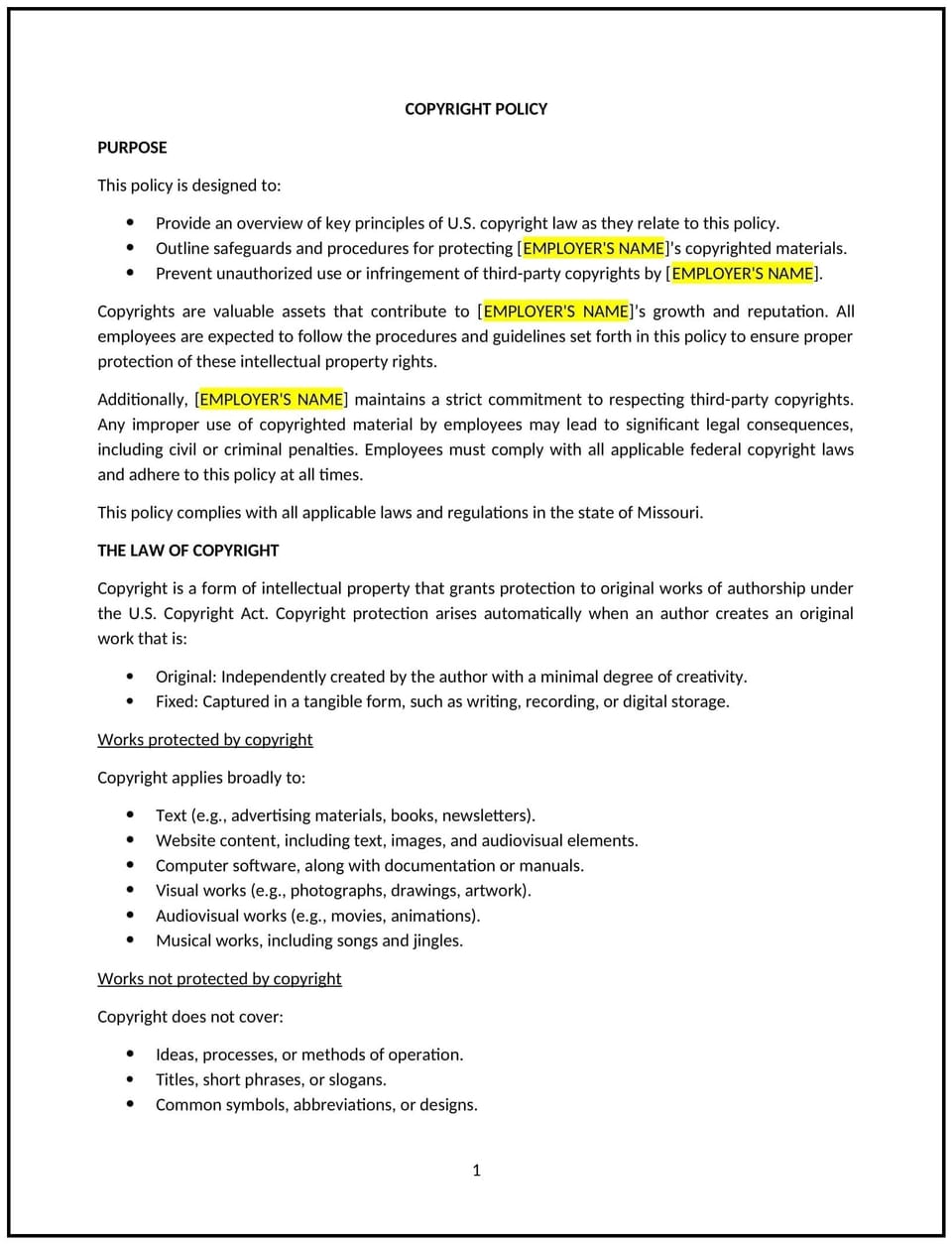Copyright policy (Missouri): Free template

Copyright policy (Missouri)
A copyright policy helps businesses in Missouri protect their intellectual property and respect the intellectual property rights of others. This policy outlines the guidelines for using, sharing, and protecting copyrighted materials, including works created by the company, employees, or third parties. It is designed to prevent copyright infringement, ensure proper attribution, and protect the business's original works.
By adopting this policy, businesses in Missouri can safeguard their intellectual property, reduce legal risks, and maintain ethical standards regarding the use of copyrighted content.
How to use this copyright policy (Missouri)
- Define copyrightable works: Clearly identify what constitutes a copyrighted work within the company, such as written content, software, designs, and multimedia.
- Outline usage rights: Specify how employees and third parties are permitted to use the business’s copyrighted materials, including any limitations or permissions granted for reproduction, distribution, or public performance.
- Set attribution requirements: Ensure that any third-party content used by the company or employees is properly credited, and clarify how attribution should be provided.
- Address licensing agreements: Establish how the company will enter into licensing agreements for copyrighted works, both for its own content and for content sourced from others.
- Outline procedures for infringement claims: Provide a process for reporting and handling claims of copyright infringement, including how the business will respond to alleged violations of its own or third-party copyrights.
- Educate employees: Provide training on copyright law and the company’s policy to ensure all employees understand their responsibilities when using copyrighted materials.
- Monitor and enforce: Regularly monitor the use of copyrighted materials within the company and take necessary steps to enforce the policy and address any violations.
- Review regularly: Periodically review the policy to ensure it remains up-to-date with changes in Missouri law, business practices, and copyright regulations.
Benefits of using this copyright policy (Missouri)
This policy provides several benefits for businesses in Missouri:
- Protects intellectual property: By setting clear guidelines for the use of copyrighted works, businesses can protect their own creative assets and avoid infringement claims.
- Reduces legal risks: A structured approach to handling copyright issues helps prevent legal disputes related to copyright infringement, saving the company from costly litigation.
- Enhances business reputation: A clear commitment to respecting copyright laws builds trust with customers, partners, and stakeholders, and demonstrates the company’s ethical practices.
- Improves employee awareness: Training employees on copyright law and company policy helps prevent accidental infringements and promotes responsible use of copyrighted materials.
- Encourages fair use: The policy ensures that the company uses copyrighted works ethically, benefiting from resources without violating the rights of content creators.
- Aligns with Missouri laws: This policy ensures that businesses adhere to both federal and state copyright regulations, reflecting the company’s commitment to legal and ethical conduct.
Tips for using this copyright policy (Missouri)
- Communicate the policy clearly: Ensure all employees understand the policy by providing clear guidelines on how copyrighted materials should be used within the company.
- Regularly educate employees: Offer ongoing training to employees about copyright law, how to avoid infringement, and the proper procedures for handling third-party content.
- Establish a clear process for infringement claims: Set up an easy-to-follow process for reporting and addressing copyright violations, ensuring quick resolution of any issues.
- Monitor usage: Regularly review how copyrighted materials are being used within the company to prevent any accidental misuse or unauthorized distribution.
- Implement fair use practices: Ensure the company complies with fair use provisions of copyright law, and understand when it is permissible to use copyrighted materials without permission.
- Review the policy periodically: Regularly update the policy to ensure it is aligned with any changes in Missouri state law or federal copyright regulations.
Q: Why should businesses in Missouri adopt a copyright policy?
A: Businesses should adopt this policy to protect their intellectual property, reduce the risk of copyright infringement, and ensure that they respect the rights of other content creators.
Q: What types of works are covered under copyright?
A: Copyright can apply to various types of works, including written content, software, designs, music, art, and multimedia, as long as they are original and fixed in a tangible form.
Q: How should the company handle third-party copyrighted content?
A: Businesses should ensure that any third-party content used is properly attributed and that the company has the appropriate permissions or licenses to use it.
Q: What should employees do if they suspect copyright infringement?
A: Employees should report any suspected copyright infringement to the designated person within the company, typically the legal team, to ensure the issue is addressed promptly.
Q: How can businesses protect their own copyrighted works?
A: Businesses should clearly outline how their own copyrighted works should be used, ensuring proper attribution and setting restrictions on reproduction, distribution, or public performance.
Q: How often should businesses review the copyright policy?
A: Businesses should periodically review the copyright policy to ensure it is up-to-date with any changes in Missouri state law, federal copyright laws, and the company’s evolving business needs.
Q: What is the process for handling copyright infringement claims?
A: Businesses should establish a clear process for reporting and addressing copyright infringement claims, including investigating the issue, taking corrective action, and communicating with the affected parties.
This article contains general legal information and does not contain legal advice. Cobrief is not a law firm or a substitute for an attorney or law firm. The law is complex and changes often. For legal advice, please ask a lawyer.


